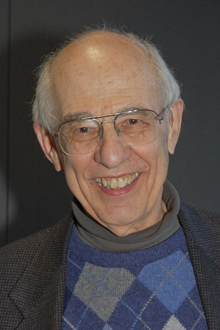Philosophers celebrating Putnam's 85th birthday
Leading philosopher of science to be honored by colleagues from around the world

Hilary W. Putnam
Putnam is a university professor emeritus at Harvard. He is widely regarded as the greatest living philosopher of science, and as having more breadth than any other living philosopher. He has written on nearly every branch of philosophy, and has made many seminal contributions.
Conference sessions will be held at Harvard's Emerson Hall on May 31 and June 3, and at Brandeis' Hassenfeld Center on June 1 and 2. Leading philosophy professors from around the world will discuss various aspects of the Putnam's work. Putnam will attend, comment on the presentations and deliver the keynote talk on the concluding day.
Brandeis President Fred Lawrence will make opening remarks at the beginning of the conference's Brandeis days, at 10 a.m. on June 1. The conference is free to faculty, students and staff of Brandeis and Harvard; those wishing to attend should send an email to the organizers by May 30.
Putnam has developed ground-breaking views in the areas of philosophy of science, ethics, the nature of perception and cognition, the meaning of meaning and Jewish philosophy and teaching as a guide to life. He also has written extensively on the relations between scientific and non-scientific knowledge and on American pragmatism.
"He is one of the greatest living philosophers in the English-speaking world," said Andreas Teuber, who is an associate professor of philosophy at Brandeis and one of the organizers of the conference. "Hilary Putnam is important first because of the wide range of his thinking in philosophy and...his ability to question a previous view and to change his mind or say this or that needs rethinking, a self-critical practice that he has incorporated into a model of how to do philosophy."
For example, said Teuber, who considers Putnam his first mentor, "he will rarely say ‘I think this.' He'll say ‘I used to think this, and this is why.' Then he'll give a very good reason. And we'll all agree. And then he'll say ‘but then I thought this - and he'll give a very good reason - and I changed my mind.' It is a very good way to do philosophy."
Putnam was raised in a secular liberal Jewish home. As he aged, he became increasingly interested in Jewish philosophy and practice. He became a bar mitzvah at an advanced age, and a few years ago published a book on "Jewish Philosophy as a Guide to Life." He has expanded his teaching activities in Israel since become an emeritus professor at Harvard in 1999. The largest foreign contingent at the conference will be from Israel; philosophers also are coming from England, Australia, Ireland and Italy.
Putnam was born in Chicago in 1926. His family lived in France until 1934, then in Philadelphia. Putnam graduated from the University of Pennsylvania and received his Ph.D. from UCLA, where he worked with Hans Reichenbach. Before joining the faculty of Harvard, he was professor of the philosophy of science at M.I.T. He has also taught at Northwestern and Princeton universities.
He is a fellow of the American Academy of Arts and Sciences and the American Philosophical Society, and is a corresponding fellow of the British Academy and the French Academie des Sciences Politiques et Morales.
The conference is made possible by a grant from the Templeton Foundation in support of a proposal made by Alan Berger, an associate professor of philosophy at Brandeis who was a visiting professor at Harvard this spring and who will open the conference. He and Teuber are primary organizers of the event. In additional to the Templeton grant, the conference has received support from the Slater Foundation, Harvard and Brandeis.
Templeton also funded an international essay competition for writing by young scholars on Putnam's work. The three winners - from England, the Netherlands and Israel - each receive a $5,000 prize to cover their travel and lodging to the conference.
Categories: Humanities and Social Sciences






